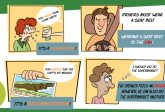Past Perfect Tense
English language learners sometimes ask “How many tenses are there in English?” There are so many tenses compared to my language! It’s driving me nuts!
Even English language experts don’t agree on how many tenses there are in English. But it is safe to say there are at least 12 tenses! Take a look at the 12 Basic English Tenses over at English Club.
This blog will look at the past perfect tense. First, watch the video above. Then read the blog and do the quiz. Rinse and repeat until you’re a past perfect tense expert!
Past Perfect - Form
We form the past perfect tense by using the auxiliary verb have together with the past participle of the main verb. Because it is a tense that we use for the past, we must use the past simple form of have, which is had.
Look at these examples:
John had gone to bed by midnight last night.
I had been to Paris twice before I decided to live there.
They watched the movie although they had seen it many times before.
As you can see in the box below, the form is the same for all the persons.
To make a negative statement we use not after the auxiliary verb. We normally use the contraction n’t unless we are writing a formal letter or email or speaking emphatically.
Look at these examples:
Kate was very tired because she hadn’t slept the night before.
We had an enormous dinner as we hadn’t eaten all day.
As I had not received the goods, I refused to pay the invoice. (formal writing)
You’re wrong! She had not called me the day before! (emphatic)
To make a question we simply place the auxiliary verb had before the subject.
Look at these examples:
Had you met Peter before the party last week?
Had they lived together before they got married?
Had she found a job before she moved to Dublin?
Had we gone to bed before it started to rain?
Past Perfect - Positive Statements
To form the past perfect we use had + past participle of the main verb
For example:
I had eaten
You had eaten
He had eaten
She had eaten
It had eaten
We had eaten
You had eaten
They had eaten
Past Perfect - Negative Statements
To form the past perfect negative we use hadn’t + past participle of the main verb
For example:
I hadn’t eaten
You hadn’t eaten
He hadn’t eaten
She hadn’t eaten
It hadn’t eaten
We hadn’t eaten
You hadn’t eaten
They hadn’t eaten
Past Perfect - Questions
To form a question with the past perfect we use had + subject + past participle of the main verb
For example:
Had I eaten?
Had you eaten?
Had he eaten?
Had she eaten?
Had it eaten?
Had we eaten?
Had you eaten?
Had they eaten?
When do we use the past perfect?
We use the past perfect tense when we are thinking about time before and up to a specific point in the past. That sounds quite abstract, so let’s look at an example
Luigi had worked in Italy for three years before he moved to Ireland.
In this sentence, we use the past perfect because we are thinking about the time before and up to the point Luigi moved to Ireland.
However we could also say:
Luigi worked in Italy for three years before he moved to Ireland.
The meaning is the same!
Here’s another example about The Smiths’ holiday in Australia:
The Smith’s went to Australia last year. They saw a kangaroo for the first time.
Here we are using the past simple to talk about two actions. Great! There is nothing wrong with these sentences. We could also say:
The Smith’s had never seen a kangaroo before they went to Australia last year.
This is a different way of giving the same information. It is not better or worse, just different!
You might ask “Why do we bother using the past perfect at all?” The answer is – we don’t use it very often. However sometimes using the past perfect makes things clearer in conversation. The past perfect is also quite common in written English , for example in fiction or newspaper reports.
Past Perfect - in conversation
Imagine you visited your friend Miki yesterday and had this conversation:
Miki: “Are you hungry? I can make you a sandwich if you like?”
You: “ No thanks, I’ve already eaten.”
The statement “I’ve already eaten” is in the present perfect. It communicates that you are not hungry now because you ate something earlier.
Now imagine you meet another friend, Joe, and have this conversation:
Joe: “What did you do yesterday?”
You: “I called round to Miki’s place.”
Joe: “Oh nice. Did she make you one of her delicious sandwiches?”
You: “No. She offered me a sandwich, but I wasn’t hungry. I had already eaten.”
In this example it would be grammatically incorrect to say I already ate.
Here are some similar examples:
We didn’t watch the movie as we had seen it twice before.
I recognized my new boss. I had met him at a party the previous week.
Although I arrived on time, John had already left.
Past Perfect - in writing
The past perfect is often called a narrative tense. We use narrative tenses to tell stories or anecdotes that happened in the past. For more information about the narrative tenses check out eltbase.com.
Look at this example from Fjord of Killary, a short story about a hotel that is flooding by Irish writer Kevin Barry:
We all looked out the windows. The water had passed the forth step and was sweeping over the porch.
In this extract we see how the past simple and past perfect are often used together. The people looked out the window (We all looked out the window) and saw something that had already happened (The water had past the forth step). Notice that the past continuous (another narrative tense!) is also used here.
Now let’s look at an example of the past perfect used in a newspaper report.
Yesterday, two men were convicted of robbing a bank. They had stolen €200,000 from the AIB bank on O’Connell Street, Dublin.
In this example, the newspaper report is about the men being convicted. The crime happened before the conviction, so we use the past perfect (the past of the past!).
Test Yourself
Vocabulary
To bother: to spend time doing something difficult or to annoy
To flood: to become covered with water
To convict: To decide in a law court that someone is guilty of a crime
Phrasal Verbs
To call round: To visit someone at their home Example: I called round to John’s house after work yesterday.
Idioms
Rinse and repeat: to repeat an action again and again Example: Practice these exercises every day. Rinse and repeat until you can do them without thinking.
Drive someone nuts: Make someone very frustrated! Example: Please stop singing that song all the time. It’s driving me nuts!
Thank you for reading our post. You’ll find more English grammar tips elsewhere on our site and if you’d like information on our English courses in Dublin, please do not hesitate to contact us.




